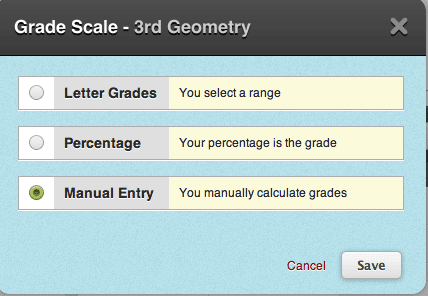If you think about it how we assign grades is a little bizarre. The first week of school I have students asking me “what is my grade” and I tell them they have an A. Do they really have an A in Algebra II? They do not have an A’s knowledge of the Algebra II curriculum… actually they have none, they just happened to have returned the syllabus signed.
How many times has this happened, student has a B and they do not do a large assignment or score poorly on a test and then are baffled that their grade went down? For some reason students do not understand that if they have an 80% they have to get an 80% on everything to maintain that. The concept that their grade can go down is beyond their conceptual grasp.
Take the student who is failing. One day they decide to do one homework assignment and eagerly ask… “What is my grade?” Well… still an F. The student does not see progress and they give up. The jump from F to D is a huge jump. They need to get 60% of the points to jump up to that level, and that can seem very discouraging. The F is just not motivating.
Let’s take a lesson from Farmville. Farmville does not give players a grade. All players start off at level 1 and through mastering farming raise their level. There is a progress bar showing how much more xp the player needs to get to the next level. Each level has a title such as “jolly rancher.”

Set up the class to say you have mastered all of the class content when you reach level 60. All students start at Level 1 and throughout the course of the year are working towards level 60. Take the discussion away from “what is my grade” to “how much xp do I need to get to the next level.” This will help you work with the students on learning and goal setting rather than grades. If you want an A in the class you need to be at least level 54. If you want a B you need to be at least level 48… by the end of the school year.
Back to the kid with an F. If he is level 3 and should be level 20 by this point in the class, if he turns in an assignment he has a real chance to be level 4 or close to level 4. He sees progress. This is an achievement that can be celebrated. Hopefully he then feels motivated to try to get the next level. A positive attitude can work wonders and hopefully this kid starts doing work to actually catch up, rather than give up and continue to miss opportunities to earn points.
My school has been using LearnBoost this year for the gradebook. Today I discovered that I can set my grading scale to be MANUALLY CALCULATED. Okay, while that sounds terrible I can change the students overall grade from showing A, B, C, D or F to their LEVEL in the class. It is not perfect, but it is a start. Hopefully LearnBoost will enable a more gamification style option to their gradebook that will let me set the levels and have them automatically calculated based on how many points the student has earned, not on the percentage.











